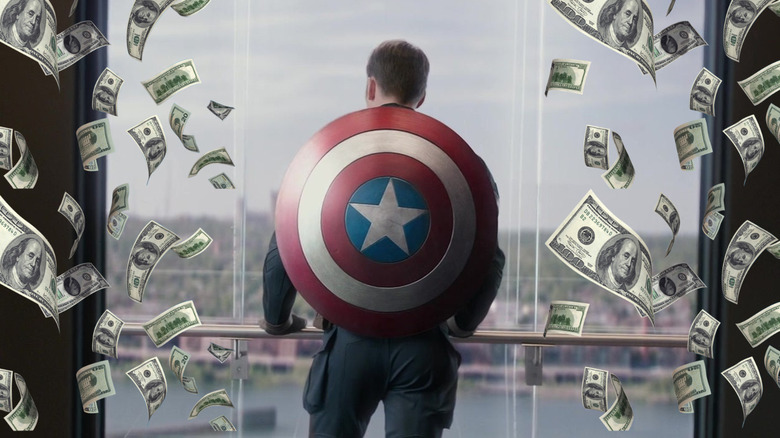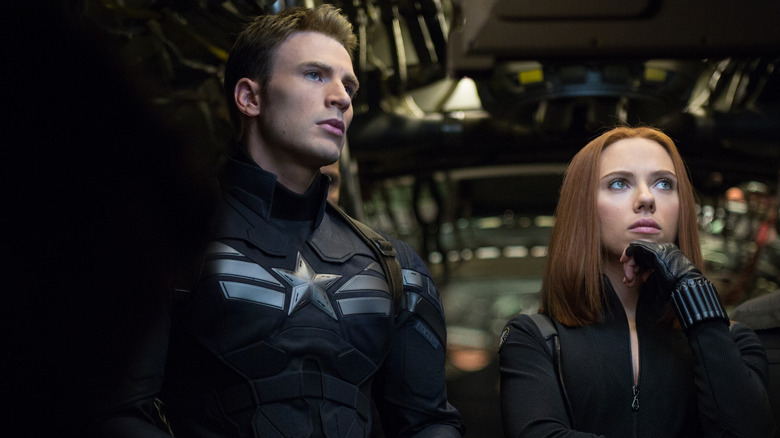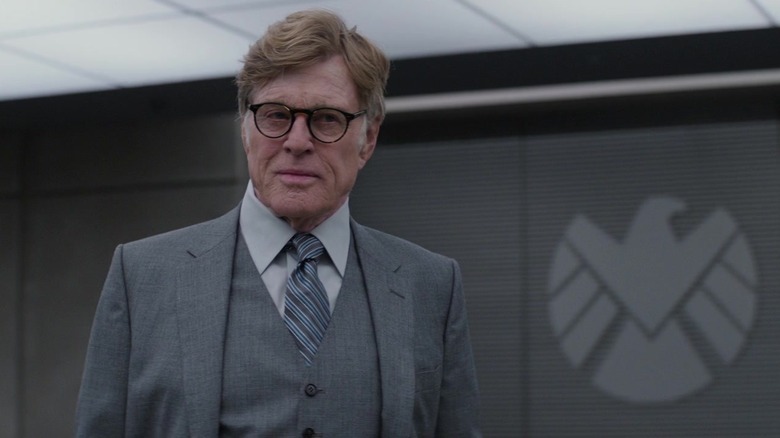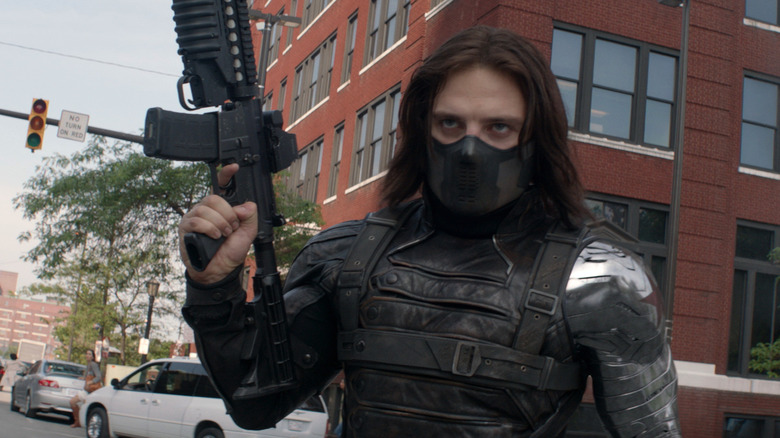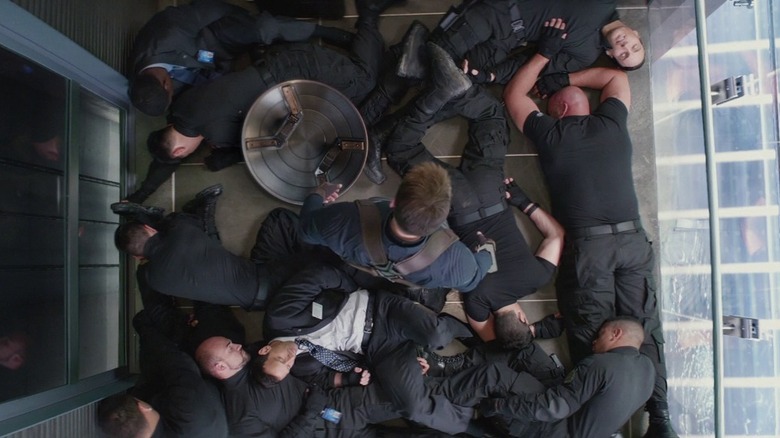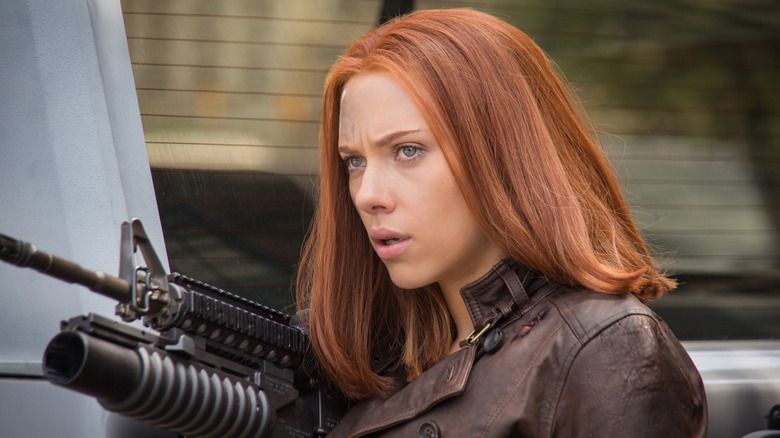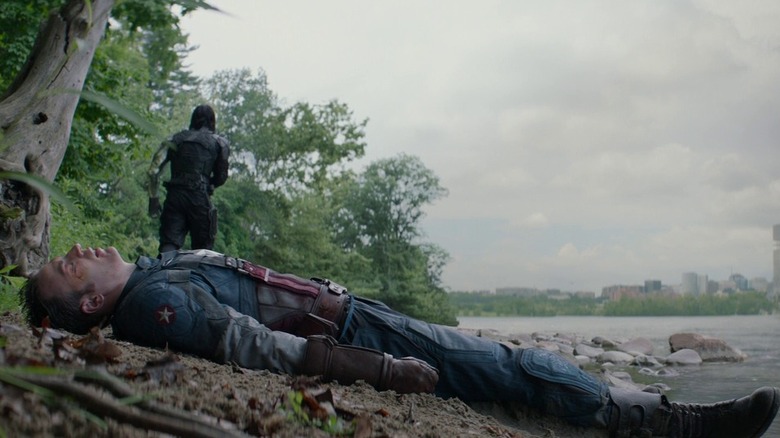10 Years Ago, The Winter Soldier Made Captain America A Box Office Superstar
(Welcome to Tales from the Box Office, our column that examines box office miracles, disasters, and everything in between, as well as what we can learn from them.)
"Holy s**t! Really?" That's how Chris Evans reacted when he was pitched the basic idea for what would become "Captain America: The Winter Soldier," according to Marvel Studios head honcho Kevin Feige "Yeah, that's the reaction we want! That'd be great!" he said in a 2014 interview with IGN. When the final product was released to the world that year, many fans ended up having the same reaction as Evans did. Holy s**t, indeed.
What directors Joe & Anthony Russo accomplished alongside writers Christopher Markus and Stephen McFeely was nothing short of game-changing. "The Winter Soldier" was a revelation then, and it remains one of the most heralded comic book movies of all time today. It was the moment that Evans ascended the Marvel ranks to help cement Captain America as a global, A-list superhero. It was also the moment that the MCU demonstrated what it could be when firing on all cylinders. In short? It could be uncompromising blockbuster entertainment on the largest scale imaginable.
In this week's Tales from the Box Office, in honor of the movie's 10th anniversary, we're looking back at "Captain America: The Winter Soldier." We'll go over how the film came to be and how the hiring of an unexpected pair of directors changed Marvel Studios forever. Plus, we'll examine how the movie took some major creative risks, despite the ripple effects throughout the larger universe, as well as what happened when the movie hit theaters, the quiet injustice that has gone on behind the scenes since the movie's release, and what lessons we can learn from it a decade later. Let's dig in, shall we?
The movie: Captain America: The Winter Soldier
The MCU was a well-oiled machine by the time production was gearing up for the sequel to 2011's "Captain America: The First Avenger." That movie was a modest success, taking in $370 million worldwide against a $140 million budget. But it introduced audiences to Chris Evans as Steve Rogers and was an important building block on the road to 2012's "The Avengers," which took in more than $1.5 billion, becoming one of the biggest movies of all time. By the time Evans was suiting up for his second solo movie, Marvel Studios was brimming with confidence and audiences were pretty much on board for whatever was coming next.
"The Winter Soldier" sees Steve living in Washington DC and working for S.H.I.E.L.D., as he tries to adjust to modern life. But an attack by a mysterious, masked assassin thrusts our hero into a tangled conspiracy that puts him at odds with S.H.I.E.L.D. Joining up with Black Widow (Scarlett Johansson) and new pal Sam Wilson (Anthony Mackie), they must try to expose the conspiracy while dealing with an unexpected enemy: Cap's old pal Bucky, who has spent decades carrying out horrible crimes for Hydra as the titular Winter Soldier.
It was a creative way to bring back Sebastian Stan's Bucky Barnes, taking inspiration from one of the most beloved Marvel Comics storylines of all time. Written by Ed Brubaker with art by Steve Epting, the original story arc was published between 2005 and 2006. Less than a decade later, those pages would lay the groundwork for an espionage thriller wrapped in a comic book movie that was less a tale about a superhero and more of an homage to old-school action filmmaking — with some Marvel flare.
Captain America contends with a conspiracy
"He is a really human superhero. He doesn't shoot lightning. He doesn't fly. It's very meat and potatoes type powers," Evans said in an on-set interview in 2014. "So I think it's only appropriate that the tone and the theme fits more of a human element. It does have kind of a very grounded political thriller tone to it, and I think that just goes hand in hand with the character."
Yes, Cap may be a super soldier, but he is a little less overtly "super" than Thor or Hulk. Hence, it made sense to bring back Johansson's Black Widow and Samuel L. Jackson's Nick Fury for this movie. Marvel Studios also brought back writing duo Markus and McFeely, who penned "The First Avenger." They began work back in 2011 and had a good grip on what they wanted to accomplish. McFeely explained how they arrived at a political thriller in an on-set interview in 2014, saying:
"The first movie was a war movie first and foremost as that made the most sense in terms of the origin story for Steve, but given what he needs to deal with as a man out of time, dealing with different values from his own and everyone he knows is dead and 'who can he trust?' and all that, the conspiracy genre seemed a really good one for him."
The duo abandoned some ideas along the way, including flashbacks to World War II because it "became unwieldy." They wanted a tight movie, and in the end, that's what they delivered. Marvel has gained a bit of a reputation for revising scripts well into production, dating back to "Iron Man." But that has, at times, proven tricky. This movie was quite the opposite experience, as the script was pretty well set in stone by the time cameras were rolling.
"The script has been in, if I may say, really great shape for a long time," McFeely said in that same interview. "We've been on set the whole time. There's not been a ton to do."
The Russo Brothers enter the MCU
The most important decision was filling the director's chair for this one. Joe Johnston, who helmed "First Avenger," did not return for the follow-up. Marvel, instead, turned to up-and-coming directors who had yet to make a blockbuster. They landed on the Russo Brothers, a duo known for work on shows like "Community" and "Arrested Development" who, on paper, did not at all seem like the obvious choice to tackle a big-budget comic book movie. Yet this would prove to be one of the most consequential decisions Marvel Studios would ever make.
"To us, when we knew it was about the Winter Soldier storyline, we couldn't run faster to the meeting at Marvel," Joe Russo said in a 2014 interview from the film's set. Ultimately, Marvel felt they were right for the gig (in part thanks to a kind word from Steven Soderbergh). Speaking a bit more, Russo revealed the films that inspired them in crafting the picture:
"There is certainly a very strong element of espionage like a political thriller. I mean this movie draws upon 'The French Connection' and 'The Conversation' and 'Three Days of the Condor' and all of these '70s thrillers in a way that there is paranoia and mistrust at the heart of the movie."
Those were, to say the least, unexpected influences for a Marvel comic book movie. But it gelled with what Marcus and McFeely put on the page, and it helped set the movie apart. They had the actors train hard. They tried to make the fights look and feel real. As Anthony Russo explained in the same interview:
"The movie was shot largely in a very verite style, which is unique for Marvel's movies. They really embraced the approach to it, and it's a very experimental approach. It's a very grounding approach. There's a strong edge to the film. It's very visceral. It's got a lot of action in it, but I think it's definitely a movement, tonally, in a different direction. It's just great to be able to add another color to the pastiche of these movies."
The financial journey
It certainly didn't hurt that audiences were very ready to like whatever Marvel delivered next. Following "The Avengers," they delivered a gargantuan $1.2 billion hit in "Iron Man 3," and even though it's oft-regarded as the worst MCU movie to date, "Thor: The Dark World" pulled in an impressive nearly $645 million worldwide. That showed just how much the fandom for the MCU had grown. So it sure as heck didn't hurt when critics came out heavily in favor of "Captain America: The Winter Soldier," with the film earning some of the most glowing reviews for any Marvel film ever up to that point. Cap was about to enter another realm of popularity.
Disney released the "Captain America" sequel in theaters on April 4, 2014. It was the only major release of note that weekend as Hollywood had learned to steer clear of the MCU at this point. The film opened with a stellar $95 million, representing a massive increase over "First Avenger," which had debuted with $65 million three years earlier. Despite dropping nearly 57% in its second weekend, "The Winter Soldier" stayed on top of the charts and fought off a trio of newcomers in the form of "Rio 2," "Oculus," and "Draft Day." It was clear that something special was happening here. The Russo Brothers' big-budget debut didn't have to surrender the crown until its fourth weekend when "The Other Woman" of all things dethroned it.
All told, the movie pulled in $259.7 million domestically to go with a massive $454.6 million internationally for a grand total of $714.4 million worldwide. Even against a $170 million budget, this was a colossal hit. It may not have been the highest-grossing MCU solo movie up to that point, but it was the one that best demonstrated just how much power the franchise had gained in a handful of years.
The MCU's popularity was never more evident
It's not terribly uncommon for a sequel to make more than its predecessor, but this is one of the biggest breakout sequels of all time. It's right up there with the likes of "John Wick" ($87 million worldwide) to "John Wick: Chapter 2" ($171 million worldwide), or "Batman Begins" ($358 million worldwide) to "The Dark Knight" ($1 billion worldwide). It's exceedingly rare air. The difference here is that "Winter Soldier" so clearly benefited from the juggernaut that was "The Avengers." The whole interconnected solo franchises that sometimes crossover experiment was still new. This was one of the moments that revealed why it was such an appealing concept to Hollywood at large. When it works, the rewards can be huge.
Naturally, Marvel Studios stayed in business with the Russo Brothers, as well as Markus and McFeely. They returned for 2016's "Captain America: Civil War," which ostensibly was like "Avengers 2.5." But it was "Winter Soldier" that ensured Cap's good name was enough to anchor such a big film. That proved to be an even bigger hit, pulling in $1.15 billion worldwide, becoming the highest global grosser of 2016. The Russos were then tapped to helm both "Avengers: Infinity War" and "Avengers: Endgame," which would conclude the first three phases of the MCU. "Infinity War" made $2 billion globally and "Endgame," for a time, was the highest-grossing movie in history.
Captain America was a known superhero when the MCU kicked off in 2008. By the end of 2014, he was a global icon well beyond what anyone could have imagined. The Russo Brothers rocketed to the top of Hollywood's A-list behind the camera, with several of the biggest movies of all time to their names. It all stems from this movie. More than that, despite everything that happened after, many would probably still call "The Winter Soldier" their finest hour.
The lessons contained within
Some of the lessons here seem obvious. Hiring filmmakers with real vision — even if they weren't proven entities — and trusting them to executive that vision. Not doing the obvious thing and being willing to take risks. Heck, they literally dismantled S.H.I.E.L.D., which had wide-ranging implications for the rest of the MCU. This movie was also allowed to exist largely on its own terms, despite taking place within a larger continuity. As the MCU has dragged on, that's become less and less possible. Getting back to a place where a given Marvel movie could stand on its own would probably be a good thing.
But the biggest takeaway is this: To date, movies starring The Winter Soldier/Bucky Barnes have grossed literal billions at the box office. Forget all of the merchandise and other revenue streams. But sadly, creators Ed Brubaker and Steve Epting have not benefited from it nearly as much as one might reasonably think. "I feel kind of like I got f***ed over," Brubaker declared in 2021. He has every reason to feel that way.
In an interview on Kevin Smith's "Fatman Beyond" podcast in 2021, Brubaker made the shocking reveal that he's "made more on SAG residuals than I have made on creating the character, for my one line that got cut." Indeed, a small cameo on-screen netted Brubaker more money than his creation of the storyline that inspired a $714 million box office smash. He's not alone either. "New Mutants" co-creator Bob McLeod has made "pennies" compared to what the movies featuring his characters have generated. The list goes on.
Every comic book creator who has influenced the MCU in a meaningful way should be a millionaire. The franchise has grossed nearly $30 billion at the box office since its inception and has generated what is undoubtedly billions more from other revenue streams. How is it possible that the creators of the source material are being left out in the cold? A decade after this movie left a bitter taste in Brubaker's mouth, it's high time that Marvel — and ultimately Disney — made this right.
